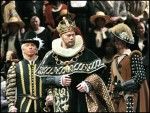Verdi Hits Hamilton

Culture is good for you. As the literary critic Harold Bloom once noted, “the augmentation of consciousness is one of the healthiest modes of life.” Culture, experiences or, to use his word, consciousness, is a good thing to have a lot of. Sort of like eating your vegetables.
So for all those cultural health nuts out there, Hamilton Movie Theater is offering you one of the biggest doses of culture that you could possibly ask for – grand opera. Last Sunday it began its Grand Opera and Cinema series. Each Sunday at 2 p.m. it will show an opera in film. The series will cover six of the most recognizable and cherished works of grand opera. The admission for each showing is $20. An intermission with wine, sodas and cheeses is included with admission.
It kicked off the series with Don Carlo by Guiseppe Verdi. Verdi is the most celebrated of the Italian composers of opera and Don Carlo might be his most nuanced and representative work.
The opera is based off the play of the same title by Friedrich Schiller. It tells the story of the Prince Don Carlo as he wrestles his way between the obligations of love and duty after his beloved betrothed, Elizabeth of Valois, is married off to his father, Philip II of Spain, as part of the peace treaty ending the Italian War of 1551-1559.
If, like this reviewer, you have never seen an opera before, Don Carlo is a good place to start. The story is made up of easily recognizable themes. The music is so rich, so impressive that it would be difficult not to be moved by it. Best of all, this cinema version provides you with subtitles.
As for the content of the play itself, let it suffice to say that Italian culture is known for its drama. In Don Carlo, Verdi was well aware of the human drama involved when you put a father-son love triangle, an idealistic royal counsel, traitors of the state, a lusty princess and a mysterious order of monks together in one Spanish castle. The producers at MTV were probably looking for something of the same effect when they put several young Italian-Americans together in a certain New Jersey beach house.
There are many moments in Don Carlo that are unforgettable, especially when accompanied by a booming tenor voice and full orchestra. The idyllic forests of Fontainebleau are seen through the eyes of fond memory. There is the inevitable embrace of forbidden love. A doubting monarch is confronted by an arrogant high priest. An entire population of people is brutally oppressed. Traitors and heretics are brought together for a mass hanging. A vendetta, to use some Italian, is seen through to its bloody end. Finally, breaking through all the horror, the celestial voice of God sounds out his ultimate mercy, represented in this opera by a particularly energetic string ensemble.
In the end though, this finest work of Italian culture is just a little bit like Jersey Shore. The elaborate costumes of royalty stand in for equally elaborate mesas of gelled hair spikes. A pistol shot from behind is just as under-handed as a stealthy bar punch. However, the one thing Don Carlo comes out with more of is real heart. Petty squabbles, cynical scheming and weird temper tantrums are replaced with genuine conflict and emotion. When you see and hear the Don Carlo bowed over a tomb, mourning a lost friend, as his once mighty voice whispers in a sob, you’ll know the difference.






